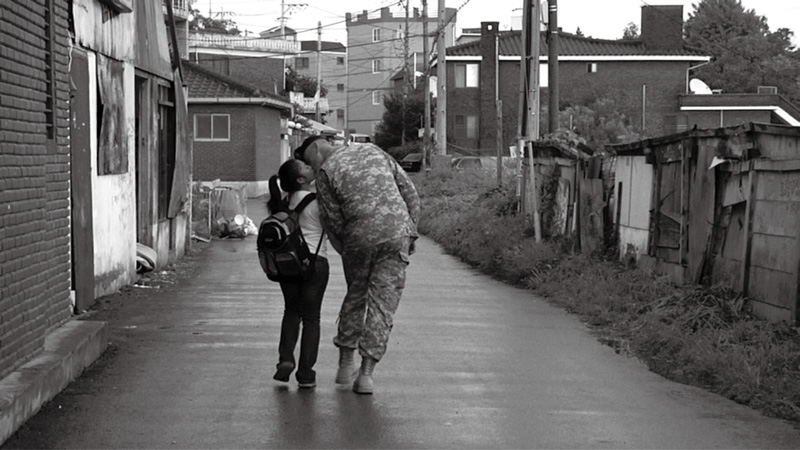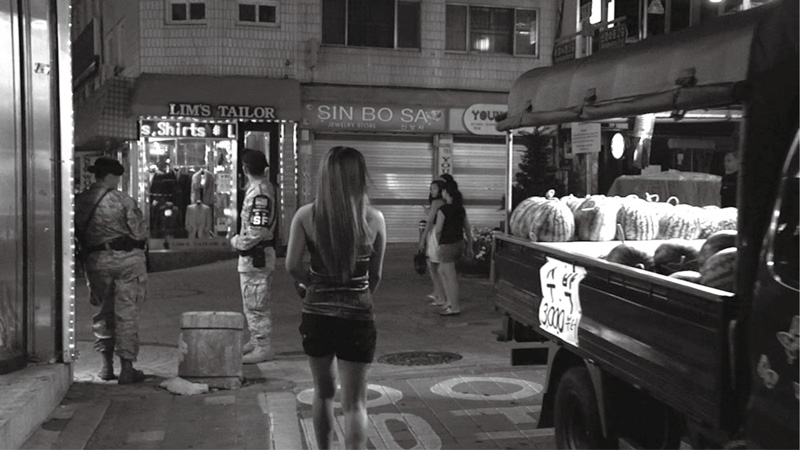<여성, 고아, 그리고 호랑이>는 폭력의 역사, 억압되고 침묵된 것에 대한 여성의 목소리로 시작된다. 점차 이들의 목소리는 일본군 위안부 생존 여성의
매우 느린 슬로 모션 이미지 대비 순수한 음향의 불협화음으로 축적된다. 형언할 수 없는 고통을 겪은 그녀는 의식을 잃기 전에 몸을 일으켜 전범재판소
중앙으로 걸어나가 거친 제스처를 행한다. 이 작품은 이전 세대에서 현재에 이르기까지 트라우마 전달 방식을 탐구한다. 국제 입양아들과 20~30대
한국인 디아스포라 여성들에 이어, 영화는 억압의 귀환(Return of the Repressed)이 어떻게 여성과 아이의 신체와 이들의 삶에 가해진 고통과 폭력의
역사를 침묵하기 위해구성된 내러티브와 대면하고 위협하는지 보여준다.
3세대 여성들의 이야기를 연관지어 계보가 형성된다. 제1차 세계대전과 제2차 세계대전 사이 일본 군대 ‘위안부’여성 - 1950년대부터 현재까지 기지촌
주변의 매춘부 여성 - 그리고 한국전쟁 이후 서양 국가로 입양된 여성. 구두증언, 공개 진술 및 인터뷰 부분으로 구성된 영화의 내러티브는 비연대순으로
계층적으로 전개된다. 다큐멘터리 기록 자료와 무대 공연 활동을 담은 역사적 기록 영상을 재해석하고 병치함으로써 여러 공간과 시간이 결합되어
군국주의, 가부장제, 인종주의 및 민족주의 연계가 어떻게 어떤 사람들을 억압하고 소외시키는지, 그리고 이 같은 세계사가 어떻게 지금 이순간에도 계속
반향을 불러일으키는지 개괄적으로 설명한다.
<The Woman, The Orphan, and The Tiger>, begins with the sound of women’s voices speaking of histories of violence, of things repressed
and silenced. Gradually, their voices accumulate into a cacophony of pure sonic intensity against an extreme slow-motioned image of a
woman survivor of Japan’s military sexual slavery who, in the absence of words to accurately account for her suffering, gets up and walks
into the center of a war crimes tribunal court room and gestures wildly before she faints.
<The Woman, The Orphan, and The Tiger> explores ways in which trauma is passed on from previous gennerations to the present through
a sense of being haunted. Following a group of international adoptees and other women of the Korean diaspora in their 20s and 30s, the
film uncovers how the return of the repressed confronts and destabilizes narratives that have been constructed to silence histories of pain
and violence inflicted onto the bodies and lives of women and children. A genealogy is created by relating the stories of three generations
of women: the former ‘comfort’ women who were subjected to milltary sexual slavery by the Japanese millitary between World War I and
World war II - women who have worked as sex-works around US military bases in South Korea since the 1950s to the present-and
transnational adopted women from South Korea th the West sine the Korea War. Composed of oral testimonies, poetry, public statements
and interview fragments, the filmic narrative unfolds in a non-chronologic and layered manner. By reinterpreting and juxtaposing historical
archive footage with recorded documentary material and staged performative actions, multiple spaces and times are conjoined to contour
how a nexus of militarism, patriarchy, racism and nationalism served to suppress and marginalize certain parts of the population and how
this part of world history continues to reverberate in the present moment.
작가명
제인 진 카이젠 Jane Jin Kaisen
작가설명
비주얼 아티스트 제인 진 카이젠은 한국에서 태어나 현재 베를린과 코펜하겐을 오가며 거주한다. 기억, 이주, 젠더 등의 주제를 이미지, 사운드, 목소리, 체현의
비선형 몽타주나 스토리텔링의 기법으로 필름, 영상 설치, 사진, 퍼포먼스 등의 매체를 통해 작업하고 있다. 그녀는 현재 제58회 베니스 비엔날레 한국관에서
김현진 큐레이터가 기획한 “역사가 우리를 망쳤지만 그래도 상관없다 * ” 전시에 정은영, 남화연 작가와 함께 참여중이다.
작품으로는 <이별의 공동체>, 제15회 서울국제뉴미디어페스티벌의 개막작 <거듭되는 항거>(2014), <입양시리즈>(2006-2015), <하나 혹은 여러 개의 산>
(2017) 등이 있으며, 최근 참여전시로는 “Decolonizing Appearance”(CAMP, 코펜하겐, 2018), 제68회 베를린 국제 영화제, “2 or 3 Tigers”(세계문화의 집,
베를린, 2017), “아시아 디바: 진심을 그대에게”(북서울미술관, 서울 2017), “아트 스펙트럼 2016”(리움 삼성미술관, 서울, 2016), “신화와 근대, 비껴서다”
(국립아시아문화전당, 광주, 2015-2017) 있다. 카이젠은 UCLA대학에서 MFA와 덴마크왕립미술학교에서 MA학위를 받았으며, 휘트니 미술관의 Independent
Study Program에 참여한 바 있다.
Jane Jin Kaisen is a visual artist born in South Korea and living in Berlin and Copenhagen.
Working across mediums of film, video installation, photography and performance, she engages themes of memory, migration, and gender
through poetic modes of storytelling and non-linear montages of image, sound, voice, and embodiment. She is currently representing Korea
at the 58th Venice Biennale together with siren eun young jung and Hwayeon Nam in the exhibition History Has Failed Us, but No Matter*
curated by Hyunjin Kim. Other recent exhibitions include Decolonizing Appearance at CAMP in Denmark; Forum Expanded, the 68th Berlin
International Film Festival and 2 or 3 Tigers, Haus der Kulturen der Welt in Germany, Asian Diva: The Muse and the Monster, Buk Seoul
Museum of Art, Art Spectrum 2016, the Leeum Samsung Museum of Art, and Interrupted Survey: Fractured Modern Mythologies, Asia
Culture Center in South Korea. Kaisen has an MFA in Interdisciplinary Art from the University of Califonia Los Angeles, an MA in Mdeia Art
and Art Theory from The Royal Danish Academy of Fine Arts, and participated in the Whitney Independent Stydy Program.
*전시의 제목은 이미진의 소설 “파친키”의 첫 문장으로, 사용에 저자의 동의를 얻었습니다.
*The title “History Has Failed Us, but No Matter” is borrowed from the first sentence of the novel “PACHINKO” with the generous permit of
its author, Min Jin Lee

